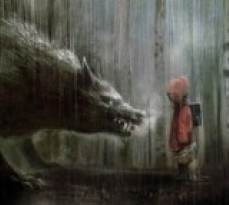Pessimism
By the time you have finished reading this anthology over one hundred people could have committed suicide, so be sure to take this with a pinch of salt. Our aim is to raise awareness of pessimism in society whilst also showing you its lighter side. Pessimism is a very popular subject in the arts. However, it is used as often for humour as it is for social commentary. This anthology should take you on a journey of depressing self discovery and give you the ability to laugh at your own misfortunes and, even better, those of others. The extracts in this anthology have been specifically chosen to highlight these ideas and they cover a range of cultures, media and time periods, whilst varying in their level of pessimism.
First, let’s look at the different media used. This anthology supersedes the possibilities of the average publication by representing several different forms of media across one subject. Furthermore, as an Internet publication this is a creation only realistically possible in the 21st century. Rather than limiting the possibilities of our theme we expanded out of standard literature with the example of Perrault’s Little Red Riding Hood and poetry with Larkin’s This Be The Verse, into film with clips from the Coen brother’s No Country for Old Men and Robinson’s Withnail and I. We also have video recordings of performance poetry with Kwesi-Johnson’s Inglan is a Bitch and Clarke’s Things Are Gonna Get Worse recorded in front of a live audience.
The content of our anthology also recognises a distinct comparative element adopting creative arts from several different cultures and spans across four different countries. The compilation includes examples of different time settings, ranging from 17th century right up to the modern day. Expanding on this several of the texts are actually set in a time prior to their conception, No country for Old Men for example was filmed in 2007 yet sets the scene of Texas in the 1980s and Withnail and I filmed in 1987 was actually set in 1969 London, each film harking back to a specific era of cynicism and misery. The contrasting cultures across the texts give this anthology a universal element ensuring its appeal globally.
Each of these authors and directors have brought something to the world of pessimistic art. As it is almost impossible to detach the art from author, we will look at how it is not necessarily a reflection of the artist but rather an embodiment of what they perceive within society that leads to the pessimistic pieces we have gathered. So let’s introduce the pessimists whose work we have deemed most miserable:
“Who’s afraid of the big bad wolf? Tra la la la la!” Frank Churchill 1933
Charles Perrault could be seen as another author who profited from pessimism. As one of the first Europeans to convert the aural tradition of folk tales into the literary, he brought an immensely popular story type to a new audience. These stories are fraught with pessimistic views of the real world as although they were adapted to suit a higher-class audience, they retain their origins as tales of warning to the children they were told to. The messages were conveyed through an imaginative analogy to ensure they remained entertaining to better get that message across. Little Red Riding Hood is a good example of this as the wolf serves as a metaphor for dangerous members of society. You should be afraid of the big bad wolf.
“We are indeed drifting into the arena of the unwell. Making an enemy of our own future.” Bruce Robinson 1987
Bruce Robinson’s Withnail and I is a semi-autobiographical exploration of the reality of aging and the end of a sixties utopia, though distorted by a cloud of booze. The film deals with two borderline alcoholic actors approaching their thirties as the seventies draws nigh and follows their struggle to deal with reality. The film’s ideology is in many ways summed up when Withnail, the protagonist, claims “I’m thirty in a month and I’ve got a sole flapping from my shoe” This suggests that at the age of thirty you should aim to have accomplished at least some of their dreams and have one’s soles (or soul) firmly attached and in good condition. The decay and decline at the heart of the film are indeed unavoidable but it doesn’t stop one laughing at two drunks and an enigmatic drug dealer called Danny who’s cool headed clarity of thought flies in the face of his belief that “what goes up must come down.”
“Writing was a political act and poetry was a cultural weapon” Linton Kwesi-Johnson 2008
Linton Kwesi-Johnson’s poem Inglan is a Bitch contrasts with the humour of other extracts and highlights the difficulties of societal integration for a first generation immigrant. Johnson deals with the hypocrisy at the heart of British society and struggling to make money. However upon contacting the man himself we were told he would need three and a half grand for a half hour appearance at Queen Mary University, which just goes to show, pessimism pays!
“If we seriously contemplate life it appears an agony too great to be supported” Philip Larkin
Philip Larkin is one of Britain’s many and most celebrated misanthropes. His poetry is bittersweet and confronts the void between childish optimism and mature reality. In High Windows he defines paradise as when he sees a couple of kids and guesses he’s fucking her and she’s taking pills or wearing a diaphragm.” From this two things are evident Larkin enjoys using the word “fuck” and his paradise is for the young and not him. His reality is much different. It is one in which your mum and day “fuck you up” and which “man hands on misery to man.” This is much more pessimistic but also much more famous being one of the most quoted modern poems in the English canon. This clearly speaks volumes about Larkin’s skill as a poet, or maybe about the fact that the English psyche really is “fucked up”.
“If I don’t come back tell mother I love her.”
“Your mother’s dead, Llewellyn.”
“Well, then I’ll tell her myself.”
Joel and Ethan Coen 2007
Joel and Ethan Coen’s film adaptation of Cormac McCarthy’s novel No Country for Old Men presents a blood bath of a cat and mouse chase reflecting the mood of violence in the post-Vietnam setting. The title of the film is taken from Yeats’s poem Sailing to Byzantium, which portrays a vision of a world in which the young flourish and the old are neglected as ‘an aged man is but a paltry thing, A tattered coat upon a stick’. Taken from the pessimistic ending of the film, the clip we have chosen focuses on the unforgiving environment of the West Texan desert, described by the Coens’ in The Making of No Country for Old Men as ‘a harsh environment, not a picturesque landscape. It’s not an easy place to live in and with a history of violence’. For some people this may be a disappointing end after the thrilling events of the film, but it has the effect of making you think about those events in a different light, bringing them into a realistic, pessimistic context.
“Considering the massive impact I’ve had on British culture, it’s fucking diabolical how poor I am.” John Cooper Clarke 2012
John Cooper Clarke’s Things Are Gonna Get Worse is a perfect example of pessimism being used to attain comedic value whilst also addressing serious issues that plague the minds of grumpy old men. The following he has gained over the years as a performance poet has defined and sculpted his poetry to pessimistic perfection.
Now let us tell you a little about our organising principle. The wolf from Little Red Riding Hood can be seen throughout the extracts as the dangerous, cruel, and undesirable members of society who cause others pain and create the pessimistic situations. In organising our extracts, we will therefore begin with Perrault’s Little Red Riding Hood. We then take you from the literary work to the highly amusing film clip, Withnail and I, where the wolf becomes the decaying aesthetic of the 60s. Society once again plays the part of the big bad wolf in the next video clip of Linton Kwesi-Johnson performing his poem, Inglan is Bitch, this time loosing the tongue in cheek humour seen in Withnail and I and adopting a more serious tone. Next is the poem This Be the Verse for a little light relief where hopelessness becomes humorous again and the wolf appears in the form of our parents. Don’t get too comfortable though because it is back to the depressing side of pessimism in No Country For Old Men where the wolf may have appeared to be the ruthless villain Chigurh, but in the scene it becomes apparent that he is just the product of a country that is hard on the people who try to survive in it. We will leave you with the very appropriate performance of Things Are Gonna Get Worse, encapsulating our take on pessimism by conveying the height of hopelessness whilst performed with dark humour jokes making it equally entertaining. The wolf can therefore be seen in the form of a neighbour that can’t be trusted, the decay of an era, the oppressive nature of living and working in a country you migrated to, parents passing on their faults to their children, the hardness of the country, and finally the wolf is old age; the one that no one can escape from except in death. Pessimistic enough?
This anthology aims to show that pessimism is no bad thing. In its conception we aimed to select a variety of extracts, which represented the importance of pessimism to our culture. The shear amount of art out there with a pessimistic focus speaks volumes about its place and importance in our culture, and the real difficulty in creating such an anthology was finding the balance between self-deprecating, humorous pessimistic art and the kind which is likely to have one desiring Cooper-Clarke’s idea of euthanasia. Therefore, we aimed to find the balance between levity and gravity, which challenges the general negative view of pessimism, while not making-light of its serious ramifications. Essentially, pessimism is just another philosophy of life, a glass half full is also half empty. This is an unavoidable fact. However, throughout history, countless authors have looked at the glass as half empty and been inspired to create art and as long as mankind exists this will continue to be the case. When it comes to the reality of depression, surely there is nothing worse than witnessing a world in which pessimistic thought is viewed so negatively. It seems much more reassuring to understand that there is a pessimist in all of us and this is best seen in the paradox in which one can enjoy reading, listening or viewing an artist discussing something extremely pessimistic. The optimist lives his life as a lie, not every cloud has a silver lining, and while being an eternal pessimist may be no closer to the truth, understanding the place of pessimism in society is surely positive. This anthology is best viewed as a refreshing glass of water … and it’s half empty.




